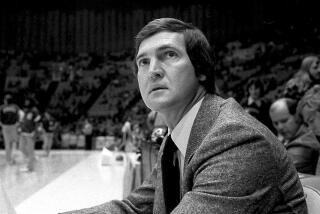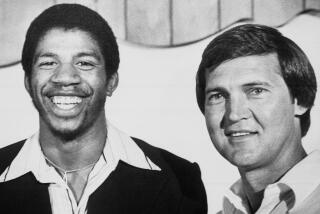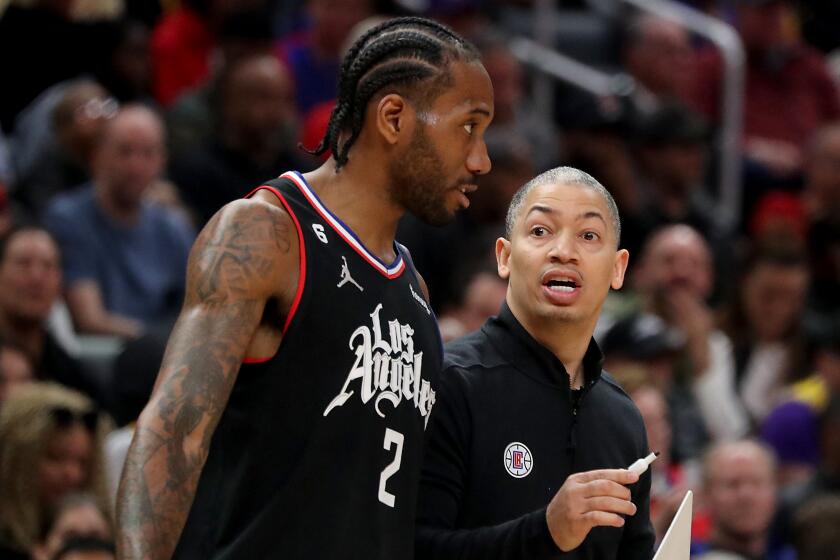NBA Notes : Pistol Pete Spent His Life Searching for Something to Fill Void
- Share via
All the Pete Maravich eulogies included stories about his singleminded upbringing, about his father putting a basketball in his hands soon after he was born, about Pete dribbling a ball in the aisle in the movie theaters, so consumed was he by the necessity to be the best.
As is so often the case, however, it was the story of a corresponding emptiness, and of Maravich’s unending quest to find substitutes for his obsession. In his playing days, it was alcohol, the same substance that apparently led to his mother’s suicide.
Later, after his 10-year professional career, Maravich seized on whatever fashionable endeavor came along to momentarily fill the void. He dabbled in astronomy and astrology, mysticism and survivorism. He became a nutrition freak. At one point, he was heavily into UFOs, and he even painted a message on the roof of his home, offering himself as a willing UFO captive.
Ultimately, he settled on religion. He became a born-again Christian and lay preacher in his later years, speaking to children at his basketball and Bible camps. He had, at last, discovered his peace, and how sad for him to be struck down after finally fulfilling his quest.
The underlying tragedy is that he couldn’t find that peace while still playing. Who among those adoring crowds in the 1970s could have suspected that this extraordinary talent, this young man who could control a basketball as if it were part of him, was fighting to control his own drinking?
Back then, of course, no one worried about such things. You didn’t hear about cocaine, and drinking was still an accepted characteristic of the pro athlete’s persona. Today, it’s different. That’s why, while pondering Pistol Pete’s death, one can’t help but notice the similarities between his story and that of Chris Mullin.
Like Mullin, Maravich had a history of alcoholism in his family. Mullin also grew up with a basketball obsession, a gym rat whose singular talent eventually earned him public acclaim and a lucrative salary as a very young man.
Apparently, those things did not bring Maravich happiness, and alcohol became his escape. Might Mullin’s basketball obsession have created a similar hollowness, despite the public adoration and financial rewards it has brought him?
It should have come as no surprise when Washington jettisoned Coach Kevin Loughery this week. In nine full seasons as an NBA head coach, Loughery had compiled a winning percentage of less than 40 percent, and his playoff record was even worse. Six times he brought a team to the first round of the playoffs, and six times he got no further.
The only injustice is that Bullets owner Abe Pollin didn’t show General Manager Bob Ferry the door as well. Since the Bullets won the NBA title 10 years ago, Ferry has adhered to a quick-fix philosophy that has succeeded only in making Washington the league’s most mediocre franchise.
Every year, it seems, Ferry brings in another fading star. Gus Williams, Dan Roundfield, Moses Malone, Bernard King ... the list is endless. Then, after the Bullets finish 39-43, he cries about his draft position and how you can’t get an impact player selecting in the middle of the pack.
But in recent years, Ferry also has made some egregious drafting blunders. In 1985, he chose Kenny Green, leaving Karl Malone available for Utah. In 1986, he picked Anthony Jones late in the first round, bypassing Mark Price and local product David Wingate. Green and Jones no longer are in the league.
Picking 12th in last year’s draft and desperate for a point guard, he gambled on 5-3 Tyrone Bogues, who has failed to justify the gamble. Had he taken Mark Jackson, Loughery still might have a job. Ferry’s worst move of all, however, took place in 1984, when he traded his 1988 first-round pick to Philadelphia for the rights to Tom Sewell. Yes, Tom Sewell of Lamar, who averaged 1.0 points in 21 games for the 1984-85 Bullets and never was heard from again.
You probably didn’t know who Sewell was until a paragraph ago, but you’ll probably hear his name a lot come lottery time. Because Washington probably won’t make the playoffs, the 76ers are bound to ride Ferry’s mistake into the lottery.
Philadelphia General Manager John Nash said Wednesday that Andrew Toney would be eligible to return to the 76ers Saturday after serving a five-day suspension for leaving the team during its recent West Coast trip. But Bob Wright, Toney’s agent, said that he would sue for back pay and other damages if the 76ers did not reconsider.
“I have no choice,” Wright said Wednesday. Wright said that he would prefer to work out “an amicable resolution,” but doubted he could.
Toney was suspended Monday, two days after leaving the team after a game in Portland, Ore. Toney, in his first start of the season, had 13 points and nine assists against the Blazers, but he re-injured his foot late in the game and decided not to accompany the team to Seattle.
At issue is whether Toney had permission to leave. He says he did, after consulting with the team orthopedist and Coach Matt Guokas.
Either way, it’s another sad chapter in the ongoing saga of Toney’s feet, which have been surgically repaired several times in the past two years.
Television announcer Dick Vitale, after watching Benoit Benjamin of the Los Angeles Clippers against Milwaukee: “He has a double zero on his back, but he should add another zero. I give him a zero for his offensive attitude, a zero for his defensive attitude, and a zero for his mental attitude ... he’s an absolute, flat-out disgrace to everyone that’s ever worn a basketball uniform.”
More to Read
Go beyond the scoreboard
Get the latest on L.A.'s teams in the daily Sports Report newsletter.
You may occasionally receive promotional content from the Los Angeles Times.










